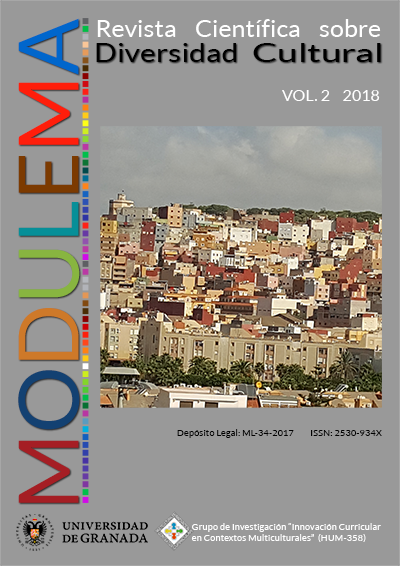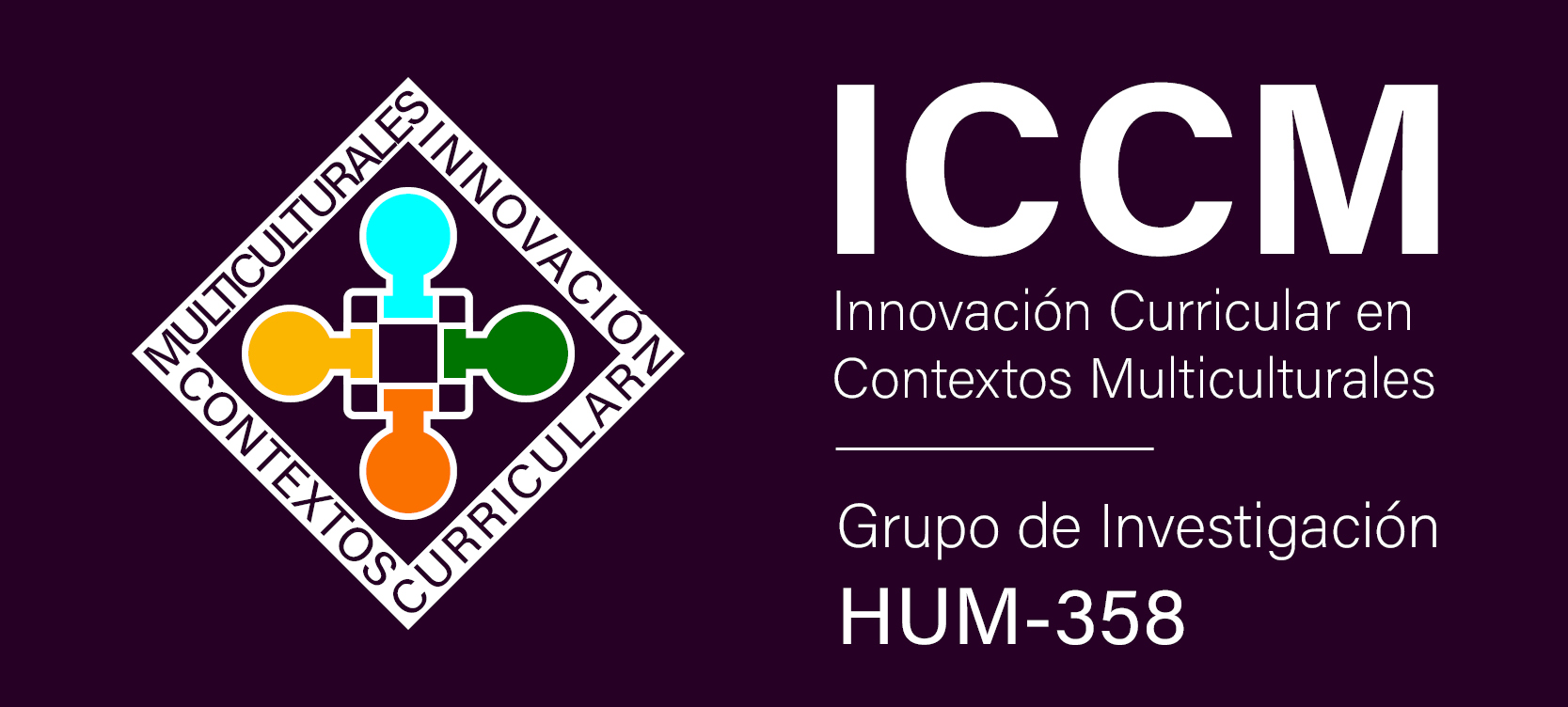LA PERSONALIDAD MULTICULTURAL Y SU RELACIÓN CON LA EDUCACIÓN EN EL EXTRANJERO
DOI:
https://doi.org/10.30827/modulema.v2i0.8299Palavras-chave:
Multiculturalismo, comunicación intercultural, educación internacional, competencia intercultural, diversidad culturalResumo
En el mundo global, donde la diversidad cultural está más presente cada día, surge un creciente interés por estudiar en profundidad la competencia intercultural, imprescindible para vivir y trabajar en contextos internacionales o multiculturales. Sin embargo, las características o habilidades que debe tener una persona interculturalmente competente no están todavía claramente definidas. El objetivo de este trabajo es contribuir a esclarecer la relación entre personalidad multicultural y educación teniendo en cuenta la experiencia concreta de la participación en un programa de estudio en el extranjero. La personalidad multicultural engloba una serie de rasgos de personalidad específicos, que favorecen o dificultan el desarrollo de la competencia intercultural que, a su vez, facilita el entendimiento en entornos culturalmente diversos. Para explorar esta cuestión se ha llevado a cabo una investigación empírica con estudiantes universitarios comparando a aquellos que estaban participando o habían participado en un programa universitario en el extranjero con los que carecían de dicha experiencia. El resultado muestra que los participantes con experiencia de estudios en el extranjero tenían niveles significativamente más altos en tres de los cinco rasgos de personalidad multicultural: empatía cultural, apertura mental e iniciativa social. Este resultado nos permite sugerir que estos tres rasgos de personalidad multicultural son susceptibles de ser transformados a través de la experiencia internacional; lo que tiene importantes implicaciones tanto para la teoría como para la práctica en materia de recursos humanos y de educación internacional.
Downloads
Referências
Akli, M. (2013). Study Abroad and Cultural Learning through Fulbright and Other International Scholarships: A holistic student development. Journal of International Students, 3(1), 1-9.
Ali, A., Van der Zee, K., y Sanders, G. (2003). Determinants of Intercultural Adjustment among Expatriate Spouses. International Journal of Intercultural Relations, 27(5), 563–580.
Ang, S., Van Dyne, L., Koh, C., Ng, K. Y., Templer, K. J., Tay, C. y Chandrasekar, N. A. (2007). Cultural Intelligence: Its measurement and effects on cultural judgment and decision making, cultural adaptation and task performance. Management and Organization Review, 3(3), 335-371
Bakalis, S., y Joiner, T. A. (2004). Participation in Tertiary Study Abroad Programs: The role of personality. International Journal of Educational Management, 18(5), 286-291.
Barrett, M., Byram, M., Lázár, I., Mompoint-Gaillard, P. y Philippou, S. (2013). Developing Intercultural Competence through Education. Strasbourg: Council of Europe.
Behrnd, V. y Porzelt, S. (2012). Intercultural Competence and Training Outcomes of Students with Experiences Abroad. International Journal of Intercultural Relations, 36, 213–223.
Bennett, M. J. (1986). A Developmental Approach to Training for Intercultural Sensitivity. International Journal of Intercultural Relations, 10(2), 179-196.
Bennett, M. J. (1993). Towards Ethnorelativism: A developmental model of inter- cultural sensitivity. En R. M. Paige (Ed.), Education for the Intercultural Experi- ence (2ª Edición, pp. 21-71). Yarmouth, ME: Intercultural Press.
Bobowik, M., Van Oudenhoven, J. P., Basabe, N., Telletxea, S. y Páez, D. (2011). What is the Better Predictor of Students’ Personal Aalues: Parents’ values or students’ personality? International Journal of Intercultural Relations, 35(4), 488-498.
Borca, C., Popescu, A. D., y Baesu, V. (2014). A Study on Multicultural Personality. Cross-Cultural Management Journal (05), 147-156.
Braskamp, L. A., Braskamp, D. C. y Merrill, K. (2009). Assessing Progress in Global Learning and Development of Students with Education Abroad Experiences. Frontiers: The Interdisciplinary Journal of Study Abroad, 18, 101-118.
Brooks, R., Waters, J. y Pimlott Wilson, H. (2012). International Education and the Employability of UK Students. British Educational Research Journal, 38(2), 281-298.
Caligiuri, P. M. (2000). The Big Five Personality Characteristics as Predictors of Expatriate's Desire to Terminate the Assignment and Supervisor Rated Performance. Personnel Psychology, 53(1), 67-88.
Chang, W. W., Yuan, Y. H. y Chuang, Y. T. (2013). The Relationship between International Experience and Cross-Cultural Adaptability. International Journal of Intercultural Relations, 37(2), 268-273.
Chen, G.-M. y Starosta, W. (2000). The development and validation of the Intercultural Sensitivity Scale. Human Communication, 3(1), 2-14.
Coleman, Jim (2011). Study/Work abroad and employability. Recuperado del sitio de internet de University Council of Modern Languages (UCML) http://www.ucml.ac.uk/shapingthefuture/Internationalisation.
Connor-Smith, J. K. y Flachsbart, C. (2007). Relations between Personality and Coping: A meta-analysis. Journal of Personality and Social Psychology, 93(6), 1080.
Council of Europe (2008). White Paper on Intercultural Dialogue “Living Together as Equals in Dignity”. Recuperado de http://www.coe.int/t/dg4-/intercultural/source/white%20paper_final_revised_en.pdf
Deardorff, D. K. (2006). Identification and Assessment of Intercultural Competence as a Student Outcome of Internationalization. Journal of Studies in International Education, 10(3), 241-266.
Diamond, A., Walkley, L., Scott-Davies, S., Forbes, P., Hughes, T., Sheen, J. (2011). Global Graduates into Global Leaders. Recuperado de http://www.ncub.co.uk/index.php?option=com_docman&view=download&category_slug=publications&alias=42-global-graduates-into-global-leaders&Itemid=2728
Earley, P.C. y Ang, S. (2003). Cultural Intelligence: Individual interactions across cultures. Stanford, CA: Stanford University Press.
European Commission (EC) (2014). Effects of Mobility on the Skills and Employability of Students and the Internationalisation of Higher Education Institutions. Luxembourg: Publications Office of the European Union.
González-González, Hugo; Álvarez-Castillo, José-Luis & Fernández-Caminero, Gemma (2015). Desarrollo y validación de una escala de medida de la empatía intercultural. RELIEVE, 21 (2), art. 3. DOI: http://dx.doi.org/10.7203/relieve.21.2.7841
Hammer, M. R. y Bennett, M. J. (1998). The Intercultural Development Inventory (IDI) Manual. Portland, OR: The Intercultural Communication Institute.
Herfst, S. L., Van Oudenhoven, J. P. y Timmerman, M. E. (2008). Intercultural Effectiveness Training in Three Western Immigrant Countries: A cross-cultural evaluation of critical incidents. International Journal of Intercultural Relations, 32(1), 67-80.
Horverak, J. G., Sandal, G. M., Bye, H. H., y Pallesen, S. (2013). Managers’ Selection Preferences: The role of prejudice and multicultural personality traits in the assessment of native and immigrant job candidates. Revue Européenne de Psychologie Appliquée/European Review of Applied Psychology, 63(5), 267-275.
Jones, E. (2013). Internationalization and Employability: The role of intercultural experiences in the development of transferable skills. Public Money & Management, 33(2), 95-104.
Leiba-O'Sullivan, S. (1999). The Distinction between Stable and Dynamic Cross-Cultural Competencies: Implications for expatriate trainability. Journal of International Business Studies, 30(4), 709-725.
Leong, C. H. (2007). Predictive Validity of the Multicultural Personality Questionnaire: A longitudinal study on the socio-psychological adaptation of Asian undergraduates who took part in a study-abroad program. International Journal of Intercultural Relations, 31(5), 545-559.
Leung, K., Ang, S. y Tan, M. L. (2014). Intercultural Competence. Annual Review of Organizational Psychology and Organizational Behavior, 1(1), 489–519.
Margavio, T., Hignite, M., Moses, D. y Margavio, G. W. (2005). Multicultural Effectiveness Assessment of Students in IS courses. Journal of Information Systems Education, 16(4), 421.
Peltokorpi, V. y Froese, F. (2014). Expatriate Personality and Cultural Fit: The moderating role of host country context on job satisfaction. International Business Review, 23(1), 293-302.
Schartner, A. (2016). The Effect of Study Abroad on Intercultural Competence: A longitudinal case study of international postgraduate students at a British university. Journal of Multilingual and Multicultural Development, 37(4), 402-418.
Van der Zee, K. I. y Brinkmann, U. (2004). Construct Validity Evidence for the Intercultural Readiness Check Against the Multicultural Personality Questionnaire. International Journal of Selection and Assessment, 12(3), 285-290.
Van der Zee, K. I. y Van Oudenhoven, J. P. (2000). The Multicultural Personality Questionnaire: A multidimensional instrument of multicultural effectiveness. European Journal of Personality, 14(4), 291-309.
Van der Zee, K. I. y Van Oudenhoven, J. P. (2001). The Multicultural Personality Questionnaire: Reliability and validity of self- and other ratings of multicultural effectiveness. Journal of Research in Personality, 35, 278–288.
Van der Zee, K. y Van Oudenhoven, J. P. (2013). Culture Shock or Challenge? The role of personality as a determinant of intercultural competence. Journal of Cross-Cultural Psychology, 44(6), 928-940.
Van der Zee, K.I., Van Oudenhoven, J. P. y De Grijs, E. (2004). Personality, Threat, and Cognitive and Emotional Reactions to Stressful Intercultural Situations. Journal of Personality, 72(5), 1069-1096.
Van Erp, K. J., Van der Zee, K. I., Giebels, E. y Van Duijn, M. A. (2014). Lean on Me: The importance of one's own and partner's intercultural personality for expatriate's and expatriate spouse's successful adjustment abroad. European Journal of Work and Organizational Psychology, 23(5), 706-728.
Van Oudenhoven, J. P. y Benet-Martínez, V. (2015). In Search of a Cultural Home: From Acculturation to Frame-Switching and Intercultural Competencies. International Journal of Intercultural Relations, 46, 47-54.
Van Oudenhoven, J. P. y Van Der Zee, K. I. (2002). Predicting Multicultural Effectiveness of International Students: The Multicultural Personality Questionnaire. International Journal of Intercultural Relations, 26, 679–694.
Vilá, R. (2006). La dimensión afectiva de la competencia comunicativa intercultural en la educación secundaria obligatoria: escala de sensibilidad intercultural. Revista de Investigación, 24(2), 353-372.




















